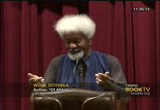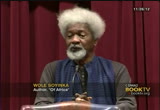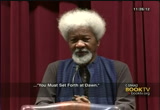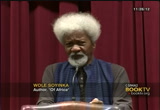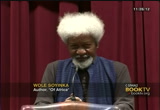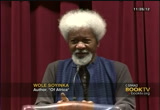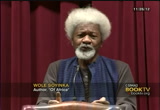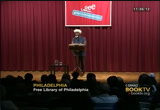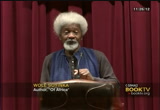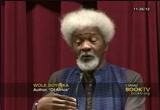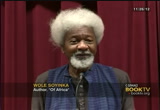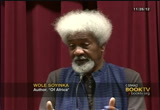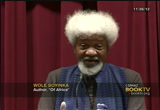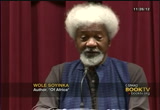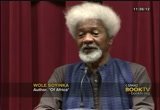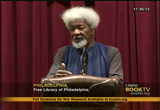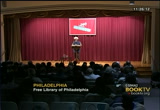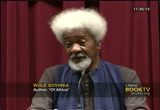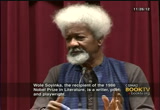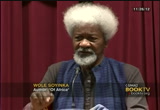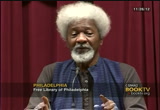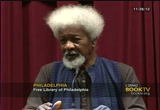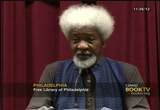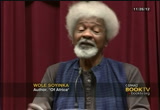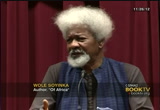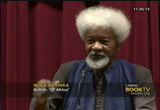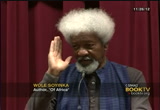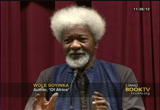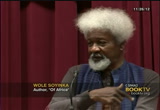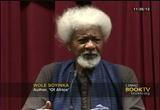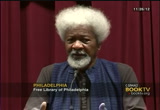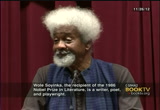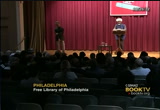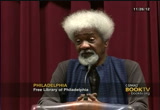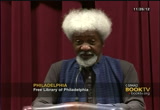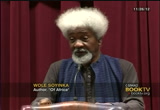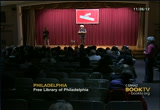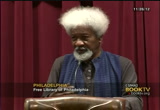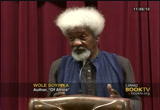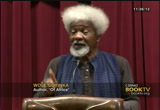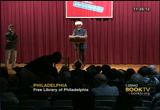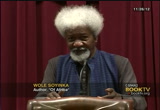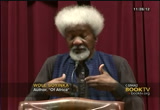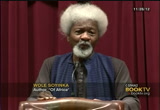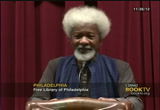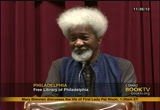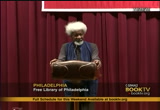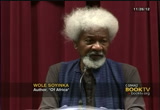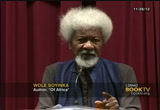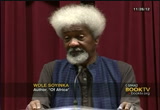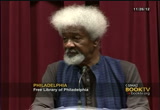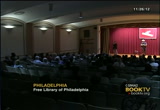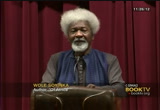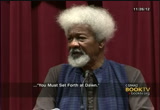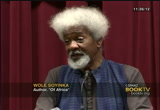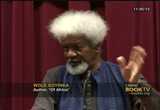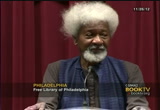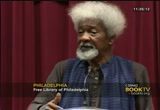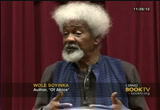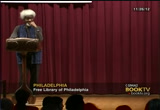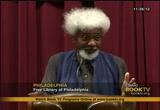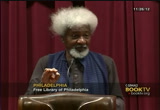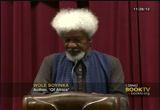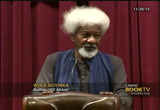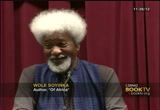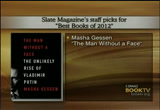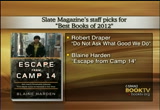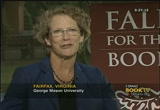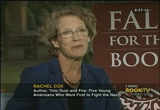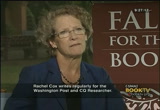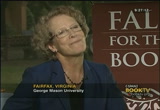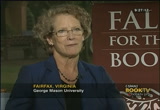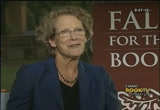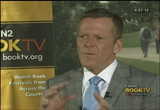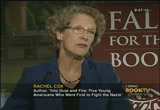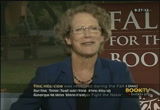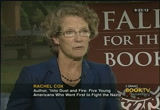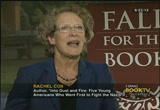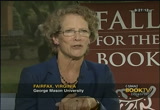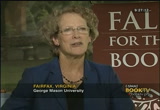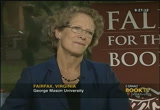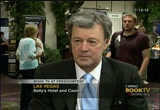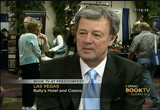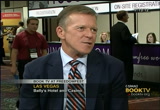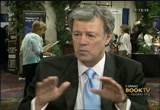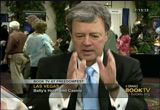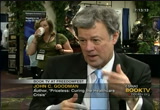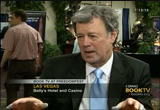tv Book TV CSPAN December 23, 2012 12:00am-1:30am EST
12:00 am
12:01 am
it was continuing conversation in which i have been engaged in most of my life. if you want examples. if you want immediate instances of the kind of encounters that led inevitably to putting down notes on the subject matter of the book, which tries to cover quite a bit of range. let's just take the religious side. with newly -- i saw on the wall a poster, titled -- announcing a
12:02 am
lecture and the title is "the greatest show on earth." and above i saw, and the god illusion. now, very strange to think that in certain parts of the world today, for daring to put up such a poster, much less admitting to be in the author of such a book, the god dilution, -- delusion, you might be stoned to death or put to death for blasphemy. the second incident. i was speaking to a young lady, and she was telling me about her experience. she'd obviously -- was lamenting the prejudice, extremist, very
12:03 am
intolerant prejudices that were taking place among the various religions of the world, she said, i grew up in an environment which was christian, which people followed their christian religion. others followed their muslim religion and others their african superstitions. and for me, this went to the heart of why the book became inevitable, or why i have been engaged in this discourse all my life. very strange. i find it very -- pretty close to 80, i should actually exist in an environment in which, for believing what i believe, or not believing what i do not believe, i'd be considered what i call terminal censorship.
12:04 am
and go back to my history, and i don't mean me personally. the time when i lived and was raised. the history of my people. when the european explorers, of course, quickly followed by their religious storm troopers, the christian missionaries. they had a very serious problem and that was they couldn't find satan. they couldn't find the devil. if you want to convert people, you've got to first of all persuade them their soul is in dire danger. headed to the ultimate bonfire on the other side of existence. after that you need to label them followers of the devil, satan. diabolical human beings. so they look for the devil, and
12:05 am
looked among the deities, and they found issue with a deity called issue. issue is an unpredictable spirit, issue exists to teach humanity, but there's always more than one fight to any issue. more than one face to any reality. teaches you the where of appearances. the best laid plans and all those -- best played plans of mice and men, et cetera, issue
12:06 am
is the embitment -- imbedment about humanity. being dogmatic about any issue, tends to do it in a rather painful way. like a good teacher, symbolically for adults who have learned the wisdom of looking at books for questions, and these places are the crossroads, which is the place where human beings get confused, which road do you take at the crossroads? issues so mischievous that he is not allowed in the house. his place is always at the door step because issue in the house is too tempermental, and before you do anything in the religion, before you worship any of the
12:07 am
deities, you make sure you sacrifice. issue is the messenger of the deities. he can deliver the message straight, but may deliver it in a way without lying that makes you misinterpret the message, and these because he has a lesson to impart. and when the missionaries came to look at the god of lightning, the galled of rivers, the god of purity, the god of war, the god of moist elements, et cetera, et cetera, and issue is the answer. this mischievous person, that's the devil. and so issue became, for christians, the devil. satan, and in the translation of the bible, each time fear of the devil, it is issue, but issue is anything but evil. that is the truth.
12:08 am
on the contrary, you find a symbol of issue in the definition bold because it is allowed to interpret the old, deidentifys the -- defies the scripture, from wisdom, from archaeology, and verses, the diviner recites. so, issue is anything but the devil. but today, it's rather painful to find one's own women referring to issue as the devil. by contrast, look at what happened to issue when he moved with the slaves to latin america. arrived with the knowledge that issue was feared by the
12:09 am
christian missionaries. the slaves adopted issue as their patron deity, just to scare the christians who wanted them to convert. issue became the paramount symbol of resistance in latin america and the americas. in fact, it went beyond that. in some parts of brazil, for instance, you find that issue has even been elevated to the supreme deity simply because that was a symbol that was there, the protagonist for freedom. as they find the transposition of deities across the atlantic, not minor, became not only the symbol of resistance in the new world, but the supreme deity in certain parts of brazil. like brazilla, for instance.
12:10 am
if you go to the heartland of the europa in brazil, and it's quite plain. but in certain parts issue became the supreme deity. now, consider today -- this was the history of the missionaries in africa, and it goes back a couple of centuries. now, imagine that kadi -- to be a faller of the religion, is virtually to earn the death sentence in certain parts of nigeria. christians also earned the death sentence in certain parts of nigeria, and some of the christians responded in kind and set upon in reprisal.
12:11 am
but the level of intolerance based on ignorance has reached such a pitch that you open the papers anytime today, in nigeria, you find a church has been burned down. worshipers have been machine-gunned. a mosque has just been burned down. worshipers bombed out of existence. because, you see, even within that religion, there are different grids of purity. on one side consider the other side not sufficiently appealing and therefore deserving, what i call terminal censorson. the nigerian revolution is more complicate. never one single issue that leads to total -- of society. politics entered into it,
12:12 am
modularization, corruption, all of these are part of the growth, the widening of the area of fanaticism,. when the politicians are on par, they have no uples whatever. right now the growing principle of dissension is religion. we have a very strange political system -- i'm moving on now to northern nigeria. and the book is anathema.
12:13 am
schooling, anything at all to do with -- anything outside the koran is anathema. it is very easy to mobilize the amajury. the unwashed, the youth, who sit at the feet of the mullah in the schools for muslims, and will take orders from them, who believe that life begins and ends on the instructions of the mullah, the cleric in charge of them. the politics of nigeria became complicated simply because of something which the british did. they weren't satisfied with just creating dissense -- dissension.
12:14 am
shown the british left -- before they left they created surrogates and they wanted surrogates closest to their image, or at least already practicing the kind of structure, feudalism, which is close to what the british were practicing at the time until late into the 20th century. and so they not only falsified the elections that followed -- that preceded independence. they falsified even the census. if you check the annals of the home office -- the so-called home office which is where the colonies of british administered, look for the book of harold smith. one of the civil servants in
12:15 am
nigeria. he got into problem because he didn't want to carry out orders. and the falsification of the first election. and then short the power was handed over to what they considered the backward north. the feudal north. the west, the southern part, west and east, were considered suspect. they were radicalized, western ideas. so they left -- that political dishonesty led to very long story -- i'll cut it short -- but led eventually to the very first military coup, which was led by certain southerners. there was a reprisal,
12:16 am
countercoup and then a series of battles which led eeventually to the secession of the eastern part because they were the larger victims, were singled out for having initiated the school and for killing, auldly, not the leaders, no disputing that fact. and so our was a story for the countercoup to the north. we suffered in nigeria, i don't know how many decades, under literary rule, eventually after the last dictator, took his leave of us in nigeria and went to the service of god in the other world. and the next president in nigeria was a former military man also, who had been president, who happened to be from the south.
12:17 am
now, remember, when the british left, they left power in the hands of the north. for eight years after that, after the military left, power was in the hands of the southerner. the ruling parties, however, inserted a principle which was just the same as the british left behind. power to remain in the -- the expression at the time was that power was just lent to the south for a few years. it must revert to the north, continue the tradition of the british. this is not very palatable, and unfortunately the president of the nation who took over after the previous one left, was a very sick man, and under the sharad -- let us say for about six months didn't know whether
12:18 am
they were being ruled bay ghost or by a living being. it was really -- the drama that went around -- went on around the presidential. so eventually succumbed to nature, and the presidency fell up to the constitution on his vice president, who was a southerner. but the tradition upheld. and within the ruling party they had already inserted that clause, nature -- that power would retain in the south. here is a southerner in power, serbing out after lots of turbulent shenanigans going on in the assembly. should he be called president, deputy president? anything but following the constitution, because they wanted power to remain in the
12:19 am
north. eventually took over as president, and then he went on in his own right now, to contest the election. well, you know -- i know what elections are like in that part of the world. it's a forgone conclusion he became president. power was slipping away further from the north. when i speak of the north i want to emphasize that i'm not talking about the entire north but i too talk specifically of a hard-core north. hard-core northerners, to whom the very concept of democracy in the fullest sense is complete nuttiness. they manipulate and insert themselfs into the various courtesies of society, and want to ensure that power is not permanently but merely in the hands of the most corrupt,
12:20 am
inincorrigible parts. but you're confronted by a very determined mafia, northern mafia, who want the power to remain with them. so the president of nigeria, who was sworn into power, sat there -- who is sitting there for four year, and then rumblings began he was going to go for a second term. now, this hard-core looked at what was happening and decided it was time to ensure that there was no repeat of last mistake. and that is when this group animated the amajuri, inflicted the religious -- said to them about their thinking, our legion
12:21 am
is in danger. the south want to take over power and stay there forever. they sent us on alpha training to somalia, to somalia, to mauritania, later on some of them even to afghanistan -- all of these facts will be coming in. not just making them up -- until eventually the religious movement in northern nigeria became allied to al qaeda. this now is an admission which the government has been very reluctant to make but which reflects the actual reality. so there you have the full -- politics and religion because the weapon, the motivation of the foot soldiers, is to create an islamic state in nigeria. it's not something that anybody dreams of. there are videos, the usual two
12:22 am
rifles crossing each other, and we want an islamic state. in fact, one of their leaders went so far, when the government was -- political leaders were proposing amnesty and talk, no, going to talk to the president as a christian, until he converts. then we're willing to sit down and negotiate with him. and so each time i hear the government say, oh, please come on, talk to us, we'll listen now. we don't know what you want. i said, don't be stupid. they said it so often and you know very well what their motivation is. that is the reason for the devastation of the north today. a country in which utter years, years of independence, certain sections of the country consider the rest nonmuslims, whether
12:23 am
christians, or whatever, as subhumans. disposable material. a very interesting thing happened, however, in the case of political movements. some of these amajuri who were sent out for training, came back holier than their masters. in other words, they were fully indoctrinated and fully ideologized and looked at their meantors and said, wait a minute. look at them in their mansions and their suvs. some of them own private jets. this is not the kind of muslim that we were taught. and so in northern nigeria, become complicated by the fact that they returned and saw their mentors and became some of the frontline victims. but primarily it's judges, it's schools, institutions,
12:24 am
libraries, if you like, the media, and that includes even music and communication. mosques are being blown up. i think they stopped eventually when they realized they couldn't communicate with their mobiles, but the half a does of them or so before the muslims said, listen, how are you going to communicate? so that stopped. but the killings continue. the churches, the mosques, because some of the mosques are considered infidels. the belong to the wrong side of things. and so all of this began to bring to boil the whole sense of religiousity, just what role physically human beings, and in any case, why are some religions considered more valid than others? is it ignorance of the other
12:25 am
religions? which we know exists and not merely among outsiders but even among insiders, among our own people. there are those who -- i'll give you a story that happened once. i a local collector of antic quits, and this one man, owns the biggest and most collection you can imagine, and a worker came to his house one day, an electrician, something or other, and he said the problem is upstairs. and went upstairs. this is in the heart of the city. so went upstairs. a few seconds later came down screaming. the devil jesus. 0 oh, the blood of jesus. this shall not -- he was looking at him, what is the problem in he goes there and encounters carvings of the deities. works of art, but because
12:26 am
they're not picasso, they're works of the devil. this is nigeria, just like myself, and this is encountered on the comic level, the absurd level, and on the tragic level, which really is where we are today. in the situation where these holy warriors go to institutions, and this is one incident in nubi, went to the school, the institution, had a list -- they'd taken the trouble to penetrate and collect a list and they called oat the children one-by-one and shot them, 46. shot them,. i try as hard as i can to be as even-handed as possible in the book, but these are issues which agitate one rightly, i think.
12:27 am
i try to be as balanced as possible. i can claim that because i have a feeling if the book -- in the process because a book sometimes begins -- even the prisoning process -- some of you know in the library -- begins and can take two years to come out. it's like the book had come out, and certain incidents had happened, specifically one incident had taken place which was one too many. i would have rather they permitted me at least another paragraph and not have been so nice, because a situation where certain religions want to privilege themselves even to the extent of assuming the power of life and death over unbelievers; that the ayatollah khomeini did
12:28 am
when he sentenced a fatwah on salomon rushdie. the most unseasonable events in history in our contemporary society. and that happened in the last century. and it's that spirit of arrogant intolerance which has contributed to my -- the need to write, because it goes beyond religion and enters politics, enters even principles of justice, and who pronounces justice, and for what, what cause. i participated just in a conversation -- i contributed to a conference at the united nations in new york, one of these peace conferences, dialogue of cultures, dialogue of religions and so on and so
12:29 am
forth. shortly after the film was made by some boys in the united states, and this, of course, again -- yet again, led to killingings all over the world. everybody battening down their hatches. and the question i ask myself, and again the sort of question we ask, what contributed to this? why is it that any one religion considers that it is so sack mikhail saakashvili crow sank, it conclude cannot be commented on in sing, any publication is in the public domain and is subject to public commentary, and for any religion to claim sanctity, it's a continuation of this same mentality that denigrated other religions in
12:30 am
their time, but now has assumed universal and diabolical proportions. some borished do it for in denmark splashes the images of the prophet muhammad, and somebody in nye -- nigeria, this kind of -- this level of intolerance has become -- seems to have become accentable... acceptable. so one needs to allow the existence of other religions to whom this kind of conduct is an abomination. tolerance of the intolerable, too much, quote-unquote, political correctness. that's a sloppy excuse for the most amoral conduct, your
12:31 am
political correctness. that seems to be crippling the democratic world and the ethical will of most of the world these days. but it's something within africa -- this is what is most grotesque -- africans have been suffering from this from the early incursion of the colonists and missionaries. they're not considered religious and not considered worthy of being defended. while those religions abhor pros thization. forgiveness for becoming compulsive spokesperson. sufficiently generous hearted to forgive me for going begins their principles.
12:32 am
thank you. >> let's begin with this gentleman in the fourth row here. >> dr. i'd like to absolute yao as an articulate spokesman of human rights and human justice we have writing today. [applause] >> so>> i'd like your take on a report on cnn that there's pending legislation in nigeria to outlaw homosexuality and then went on to reflect that, by
12:33 am
interviewing four or five people in the street, that it in fact reflects that the majority opinion of the citizens of the country. >> well, okay. i just completed an article which will go out in the media in response to this legislative misadventure. it was first mooted as a matter of fact sometime earlier -- last year, and people made their responses, i made mine, too, and somehow i thought they had forgotten all about it, decided it was best to leave it alone, until is resurfaced a few -- a couple of weeks ago, and i published an article soon. i find it -- for me, human conduct, personal, private,
12:34 am
human conduct, between consenting adults, is no business of government. and i find it ridiculous that the government should consider itself -- i mean there's no difference between that and what's been talking about, the vigilante squad, big brother is now watching you. is my hand touchingous? when the islamic council was still in power, they ordered the cutting of hand if a man shook hand with a woman. i find absolutely no difference between the two. and what is really absurd, and which i'm reminding the legislators the hypocrisy. a senator imported an underage girl from egypt, virtually
12:35 am
budget bought this girl from her father, brought her into thigh year gentleman, married her, consummated, and sent the girl back to school. now, the laws of egypt definitely forbids this underage marriage. the laws of nigeria forebit this conduct. turned out in fact this was a man, a serial pedophile, gets a younger one. the media scream they're heads off, the women's organizations scream they're head off but that man today, the senator, never prosecuted. on the other hand he claimed, he said anything that the koran says i should do, i will do. anything the koran says i shouldn't do, i won't do. and nowhere does the koran say i
12:36 am
cannot marry an underage girl. the laws of two countries are stronger -- superior to the nation's constitution. of course, screams and articles and so on, but important things, until today not been prosecuted. so they have no moral authority to promulgate an edict like this. >> another question here. yes, gentleman six rows back, and thin mirian moorehead. >> thank you, doctors. i feel that we can say the -- one of the things you find around the world, about religion, most countries that actually kept original religion, compared with the development right now, kept their religion or developed far superior and better than countries --
12:37 am
america, christianity, islam, put religion into our system, and if you look at hindu. ism, they tend to be more proper, more developed than african. would you comment about it? >> i missed that. what is the name -- [inaudible conversations] >> i believe that religions are a problematic issue. very prom almostattic, but proper religions are tied to cultures and those who are immersed in their own religion means they are culturally tied to their roots and it's only when you're culturally rooted you been culturally creative. and even scientifically.
12:38 am
the japanese get their religion, can see how far advanced, in the sciences. the chinese can be a religion still today. they did flirt with a religion called communism for a number of years, but only became capitalists and doing well because basically they are rooted in cultures, and from the cultures you evolve all -- so i agree with you absolutely. and one which i forgot to mention was a -- when the slaves went to the americas and they found themselves being banned from studying -- from following their religion. so what they did is said, yes, master, we won't follow our religion but substituted the same for the deities. so until today you'll find
12:39 am
st. lazareth. one of the healing sins, st. anthony, the lady of the candles, et cetera, et cetera. they went through that phase, and even evolved a means of re-creating images of their deities in slightly stylized mode so that they could claim that those figures stood for the things and that is how accomplished they were in creating human beings. still today you find this phase existing but also there was another phase which is very prominent -- which is said
12:40 am
christianity, go away, and you find owl the deities there in their original splendor, and come from the same. so, religion itself, never stuck. >> yes, gentleman in back there, and then down front. >> hello, professor soyinka. as a second generation consumer of yurba culture, find myself instead of representative -- sorry, i'm missing most of that. >> a consumer of yurba culture. raised in nigeria and brought here. my mom was a student of yours, but since then we, the children, have only consumed it more from fiction and in your book you made a statement where you said, as long as we continue to
12:41 am
fictionalize the events and experiences of africans, we are doomed to repeat the kind of repetition that sort of perpetuates the same problems we're having. how do you -- can you comment a little bit on how we as this young generation can reconnect to the essence of our culture that allows us to maybe in any way carry on or gain something we have lost. >> well, the question is, what would you say is your religion today? you talk about the second generation, right? and especially those who are exiled from the origin. well, the question you have to ask yourself is, to what religion do you feel attached? if you're christians, to me, if you really feel christian, then
12:42 am
stay christian. if you feel muslim, you know, and then the nation of islam in the united states. i know of a number of people from the caribbean and the americas who have made pilgrimages home to find out just what is the essence of their spirituality, which deity represents, captures what they feel inside, spiritual beings, because whether we're religious or not, all of us are spiritual beings, at least a small fraction of us, and so many people -- the structuring of that spiritual feeling, and so religion. and i think should never hesitate -- i find quite honestly all religions equal. all religions have something to offer humanity, whether it's in
12:43 am
the nature of music, or beautiful architecture, you know, the cathedrals and masks, shines. music, the scriptures can make fascinating reading, whether you believe it, accept it or not, or the arguments that go into building this can be very riveting. so, from that point of view, i don't think should compare to follow yurba or other religion simply because you come from africa but you'd be losing something if you did not at least make the inquiry and see what is there so you can take a comparative attitude and then stop and follow your head. >> lady in the third row. >> can you talk about jonathan,
12:44 am
including where his name came from? >> sorry in. >> talk about jonathan and where his name came from. >> oh, goodlow jonathan. one of the things we're very good at in nigeria is names. we are the most fascinating area of names. and it begins from the traditional languages, and when you see names like, god's will, god's spell. good luck, blessing, there's one religious i have whose name i absolutely refuse to call. his name is sweetheart. [laughter] >> i don't know you. you're not my sweetheart. give me your traditional name. that's the one i'm going to use. i'll never call you sweetheart. so, many of these names are
12:45 am
literal translations, like, good luck, could be -- or -- you find -- so some right from english, say, what do i want to say? -- and so this is the name. and he was called goodluck, heaven knows what happened in his parental home, but wasn't much lottery at the time. i think there's many nye jeerans -- nigerians don't feel that -- well. >> gentlemen off to our left, seven rows back. >> i read your book many years ago, called "the hope and soul on the continent" and speaking
12:46 am
specifically about your execution of kensor in the kind of disparity of the death penalty in nigeria was compared to the political execution of kensara as opposed to the enemies that were languishing many years. i wanted to speak on -- you know the death penalty is not, i don't think, completely outlawed in nigeria. speaking on the judicial killings that go on by the authorities in some part, nigeria in particular, in northeast, so-called suspects executed in public places in masses in some cases. >> yeah.
12:47 am
that's one huge blot on the nigerian -- nigeria. it is under different leadership, as you remember, and a particularrally brutal british -- this kangaroo trial, messy period in the region, some kids were killed. brutally killed by -- by some of the militants, in the south, but there was absolutely no evidence that he had a hand in it. that is the main weapon, and you so fear in the populace if you
12:48 am
not only organize an injustice, but you do it in your face, and in the face of international protests, appeals, your dictator wants to show, i can do it, and therefore i will do it. and so that means the rest of you, you better take care. if i can do to this one, i can do it to the rest of you. that's the principle, very abysmal mindset. the haram situation i should mention has also been compounded by a similar attitude on the part of the joint task force. there's a kind of eventual attitude which led to the
12:49 am
killing of innocent people in the north. and unfortunately, this is something which most nations undergo time and time again, whenever they're confronted by the terrorists movement, because there's not a word to call -- no word to describe the haram. i don't consider them a religious body at all. and many muslims have actually come to denounce them, even those who crowed at the beginning, who felt, ah-ha, these are the champions of -- not only of the region but of our religion. some of them, quite a number of them, have come around to understand that this is a bunch of psycho paths who are, however, completely wrapped up in their religion. they really believe that it's
12:50 am
perfectly normal to kill in the name of religion. it justifies the headlines which appear in the media at one time said, killing is believing, and reaches such a state, it's like a badge of identity, of preferment in the eyes of the deity, just to kill, kill in the most gruesome way possible, and unfortunately it's one of those situations in which the solution has to be mixture of political handling but one of very strong security intelligence. >> a fellow to the right here? >> greetings, doctor. i want to thank you for your scholarship. at it important along with two other recent books by african writers. the first, the eloquence of the
12:51 am
describes, and the second being, something torn anew. as an african in america the empulse to look to the continent as the source for our -- like you said, our spiritual beingness, as the source not only to survive what has happened to africans in the western hemisphere, has always been there. one of the things he does is compare that impulse to africans on the continent who have in many ways lost the spiritual tradition. so the question for me is the preservation of these traditions and how do we, as africans throughout the world, in the face of the west that will not let us in the face of an arab world that will not let us, how
12:52 am
do we engage and ensure the avenues to our own, leak you said in the book, guides to existence, are still there, and what are the roles of africaians thinkers and scholars in preserving these traditions. >> there have been many moves within the united states among the african-americans here, a return to source, sometimes complicated by the politics of ideological leaning. i remember the fight between the -- curl to all ideology in '80s and '90s. seem to be settling down. if you want to talk about real cultural -- it must go, and i think many african-americans
12:53 am
realize this -- can't go beyond simply wearing a dishiki which unfortunately many took african culture. a continent from which to draw source. an academic gown went beyond symbolism and became the profound material of sense of belonging. so, it is necessary to quarry into the spirituality i believe of any society, to quarry into it in order to be able to distract the valuable and valid cultural weaponry within that society. i am impressed by the consistency which with the
12:54 am
kwanzaa season is celebrated in the united states. i believe it's coming up again in december this year. it is a move in the right direction. but i think a lot of depth is required in the approach of african-americans. the only way to do it is not just in the classrooms, also too seize the opportunity, i think, of visiting africa, the real africa, not the french africa, nor the arab africa, not the british africa, but there are places on the african continent in which even when european visitors who have been to south africa or been to some other places, when they enter the city they say, ah-ha, i can smell and feel and taste africa, and those places exist, and to go there and sit feet of the leaders, the
12:55 am
cultural leaders, spiritual leaders, just to expose yourself. it's almost like a kind of osmosis in which you actually imbibe the totality, you understand the comprehensive nature of the cultures which animate such societies, and from which he artists and builders, architects, even the rule, not this opportunistic slogans like the mobutu, and all that kind of thing, but just rhetoric or personality cult. just among the people. and you find in there, then when you come back you spread the word. you convey the essence of what
12:56 am
you observed. it's the only way it can be done. and then of course if you have no feeling for it, you have no feeling for it. richard wright came to africa, looking for his african roots. it was total disaster. he came out saying, i don't belong here. and richberg who was an ambassador at some time looked at the negative side and felt that was all there was to africa, and he abandoned hope and ended up being japanese. [laughter] >> but just to go into it, exposing yourself to all the experiences. >> just to clarify a point i think may have been represented. doctor, you're not saying the west and the arabic realms -- you're saying within africa those influences are going to
12:57 am
dissipate and it's the africaage spirit that will come through. yes? >> are you saying that you sense a kind of incompatibility of the moment between the arab culture -- >> no. i think the gentleman misconstrued what you were saying in the book. that's what i'm saying. but not that the west and africa -- and the arab world are going to disappear. within africa, i thought, in the book, you were saying that those will not ultimately triumph. that will be the africans that triumph. >> very different. this is something which we must stress, and there's no harm, and there's richness in stressing it. i don't consider culturally speaking i don't consider that the arab world is identical with the african world, and i believe that most arabs culture -- it's
12:58 am
very unique. even some of them not only believe they actually articulate it and say that, it's spirit to african culture so they make a distinction, and what is happening in the sudan is a political manifestation of that dichotomy. people occupy the same land mass, doesn't mean they're the same, and there's nothing wrong in being different. the important thing is to coexist on an egalitarian basis. the moment there's any suggestion of superiority, that is when problem begins, and there's nothing more interesting than the fusion of culturals, where they can win -- the synthesis can emerge. one of the most innovative jazz musicians here, took both from black africa and from the -- and produced some beautiful music.
12:59 am
and a south african musician, when he became a muslim, most impressive. fascinating what he began to do with the melodic tunes. so many levels in which all cultures interact one way or the other, including even the europeans and africa. >> we have time for one more question. let's end with our poet here off to our left. >> welcome to philadelphia, doctor. we have met twice before, first time dennis introduced me to you and then one time i ran out on walnut street chasing you to remind you that we had met. my question is twofold. one, how long do you think it will take world civilization to
1:00 am
1:01 am
the guardian of the heritage, cultural heritage etc. etc. to start recognizing the cultural heritage of the minority societies, minority and designated them also part of world civilization heritage, including the religion of europe which we are talking about designating and recognizing the fact that there are some things called intangible heritage of the world. societies which have no rich culture did not thereby like the civilization and this is a
1:02 am
policy which now unesco formally utterly appears to promote in his recognition and designation of a number of formally cultural aspects. the second one is of course the exponential increase in exchanges, cultural exchanges between the african world for incense and the european world. reparations. two may reparations are a truth. i have addressed the world bank and looking at reparations once and for all. why don't we get together and restore, return all of the
1:03 am
artifacts from african continent and forget -- just returned everything. [applause] what bothers me about some of the exponents of reparations approach that they take is once you launch a new topic, once you launch it in public discourse you prepare for the ramifications of whatever position it is. you cannot align yourself and cannot pretend, in other words just try and silence those who say wait a minute, you also took part in the sale of your people. you took part in hunting them
1:04 am
down. you created artificial wars so you would have more slaves to sell to the europeans and you have just got to admit that. it's a fact of history. the evidence is there, intact. their memories, the descendents of those who knew the family sold them. but then whatever reparations i believe the facts of being culpable in your own misfortune even in law does not necessarily mean that you are not thereby entitled to redress under the law. the redress might take a different form. you are allowed to confess that you left the window open at night and the -- came and buts the thieves, and under the process it takes more than you agree they should take. i think they have a right to say that they broke the bargain. but we have got to have the
1:05 am
truth all out and especially as i always keep reminding people, especially you still have the spirit drove heirs of those slave traitors among us, ruling us and exploiting us and it's necessary to point to them and say you, you are one of those who sold our people overseas. >> i willish we were ending on a happier topic but please help me in thanking wole soyinka. [applause]
1:07 am
>> rachel cox, who was rob cox? >> a rob rob cox is my deceased uncle, who made that decision in june of 1941, six months before pearl harbor brought america into world war ii, he made the decision that he wanted to fight the war against fascism and went to england and enlisted as an officer candidate with the british army. he took with him for friends, another man who was a student at harvard and three dartmouth guys who had recently graduated and were intent on doing what they could to help the cause of freedom and liberty against the
1:08 am
forces of nazi fascism. >> so he was studying at harvard at the time. what was he studying and what was his life trajectory at that point? >> well, he, like his four brothers, had grown up in new jersey and vermont where his family had property for several generations. he went to prep school at st. paul's school where he distinguished himself as a student and as a student leader and as an athlete and like all his brothers and his uncles and his grandfather before him, he was quite literary. he was a good writer and known as a good writer and when he went to war, he kept journals and wrote wonderful letters, which i hunted up and explore to find it really the story of what happened to him when he went to war. and i knew growing up that he had been killed. by the time i came of age he was gone of course.
1:09 am
he was killed in 1943 in tunisia and that is pretty much all i knew about him except for what he looks like. there were momentous around mike and mothers house and about six years ago i decided i was going to see what i could do to find out more about it and that was the beginning of@w this journeyf discovery that led to the publication of my book. >> "into dust and fire." >> "into dust and fire." >> so his life was a good life at that point, right? there was the family back in etc.. >> were comfortable, yeah. >> what inspired rob cox to six months before go off to europe? >> well this is one of the questions that fascinated me when i started researching the book. he was an idealistic young man, and i know that. he went to a school that was a christian school and he was somewhat religious and felt that life was meant to be about more than just yourself.
1:10 am
it was meant to be helpful to others in that kind of thing and there were a few less noble motivations. he graduated from college and had no obvious plans. he had but we would now call a lerogue -- low draft number. he knew there would be a chance to be drafted into the american army which had resumes the draft in 1940 but had no clear plans to ask the go-to war and wasn't too excited about spending the next couple of years training for no apparent purpose. so he was casting around for something and i think this fulfilled a lot of meaningful, fulfilled a lot of meaningful goals for him. >> how did he get from harvard to england? who did he contact? >> yeah, that is a good question. he learned about this opportunity at his harvard club
1:11 am
which was sort of the equivalent of fraternities at harvard, a little more self-important i guess. but, someone came to talk to the guys at the club who had made contact in england with the american ambassador, the british foreign secretary, and it worked out a way for this regiment called the kingsborough rifle corps which had actually formed up originally in america before the american revolution. it had its roots in the french and indian war, and of course after the revolution there were no more americans in the richmond buddy in 1940, 41, seemed like a good way to maybe bring a few americans into the battlefield and through various informal channels i guess you would say, arrangements had been made for a few americans to join the kingsborough rifle corps and become officers. so when my uncle heard about this he thought, it sounds pretty good. >> now, was he the leader of the
1:12 am
five, the band of five when he went over? or did they separately decide to attend as well? >> well this was sort of the center of the group in that he made the decision to go. there was one other harvard void really, he was only 19. he was a sophomore in college who had grown up in england, come back to america. he was american but was racing england. came back to america to go to harvard and he of course was desperate to get back to england to help his friends fight the knots he -- at that point in 1941 england had just barely been invaded by the germans. the battle of britain was pretty much over but they were still being bombed regularly. they were in a terrible position and they need all the help they could get. i think that appeal little bit to my uncle's sort of sense of chivalry. he like to help the underdog and anyway getting back to your
1:13 am
previous question, as far as beating the leader of the group he knew about this opportunity. he went one day to his old prep school for their homecoming event and met with an nx remake, former roommate who was there that went to dartmouth. he tried to to talk his friend in the going with him. his friend decided not to go but he took news of this opportunity back to the dartmouth with him when he went back to school and told his friends there who were very active in the interventionist movement about this opportunity. they thought it over for a little while and not very long and pretty much jumped at the chance. by uncle was the lynchpin of the group. he was the reason and knew about the opportunity but i wouldn't say he was exactly the leader. >> what did you learn about his experience in england before he did any fighting? i mean was it through letters home, through research in england? how did you find out exactly what happened?
1:14 am
>> he wrote home to his mother almost every week. letters of of two or three typed pages so there was a lot of material to read. i did go to england. i went to the regiment newseum. the kingsborough rifle corps has a museum where the documents and record everything, pretty much everything they do. there are regimental chronicles there you can read and i saw where he had lived in i also managed to track down relatives of the other four soldiers who also had stacks of letters and diaries. three out of the five young men saw themselves as writers. two of them were committed to being professional writers when and if they return from the war. so they kept really good records you might say. that is the main way that i learned and i interviewed for instance some people who remember them and knew them. wired from soldiers who trained
1:15 am
with them in westminster in england so i was able to get a lot of information. >> of the five, how many survived world war ii? >> three survived. my uncle and another fellow named jack brewster were both killed very close to the end of the north african campaign in april of 1943. >> what the happened? >> how did they die? >> yeah. >> well, he was an isolated position. i went to tunisia to see with the land was like, where they were fighting. it was wonderfully interesting and exciting. it's a very broken, dry, rocky hill he kind of terrain and any smog group friend who is separated from the body of their battalion was very isolated and it's very difficult to get -- i'm giving it away the end of the book and i don't really think this is a good idea.
1:16 am
>> it's up to you. >> i won't go into too much detail. basically a sniper killed them. it was kind of under noble circumstances. he volunteered to go out with another man to find it gun position and in the course of that, there was a guy behind the haystack and he just took them out with their rifle and unfortunately he was so far from that of the help that he bled to death before he could get the kind of help they needed. >> by the 1943 beowulf fully incorporated into the british army? >> oh yeah. >> not part of the american expedition of force is? >> that was an issue for them all the way through. before they went committed point of making sure they be able to transfer to the american army if america actually joined the fray. one of them, jack brister, the other fellow killed in tunisia made the decision to transfer to the american army in april of
1:17 am
1923, not long before he was killed and he got the paperwork done. john gilbert winan, so they had good connections and jack brewster jess -- brister requested a transfer. two hours after he was killed, and i won't explain how he was killed. the readers can get the book to find that out. two hours after he was killed, the papers came through for him to transfer to the american army. >> the three they came back, what kind of careers did they pursue? >> well, chuck alt-a was a man who was an editor at the daily dartmouth. he had been sort of a committed newspaper man from the time he wrote in high school for the rich connecticut newspaper. and he came back and went to work for the voice of america,
1:18 am
writing press dispatches. but he very quickly was diverted to an effort to found a new veterans organization. it's kind of an interesting story too called the american veterans community which was intended to be the new organization for returning vets just in world war ii. they envisioned it as a professional organization and was integrated into the vfw and the other one. >> the american legion. >> thank you. i said the foreign legion. the american legion. anyway that kept him occupy it for a couple of years. than he then he had a career in publishing. he at the end of his life as a freelance writer. he was a writer. the other two became architects. he was a very good drawer. he was drawing pictures and he was an ornithologist. he would drop pictures of birds. the third guy, al turkey,
1:19 am
remained involved in international affairs and worked for the cia, the defense department so he was interested in politics all the way along end state involved working for the american government. those three were very seriously injured early in their time in north africa, which is in a anyway why they survived.y >> rachel cox.s this is her book, "into dust and fire," five young americans who went first to fight the nazi army. we didn't want to give away too much of the ending. we gave away a little of it. rachel cox, as another -- has another uncle who became rather notorious and that is to? >> archibald cox. everyone in my family called him uncle bill. nobody knows why. that was as big name. maybe he just didn't like being called archie. >> so you called him uncle bill. i obviously he is well-connected to the watergate era.
1:20 am
what do you you remember about that era? >> yeah, well i think the general feeling was that it was characteristic of him to resign when he was put in a position -- i guess he was fired actually. he didn't resign but anyway he left. he wouldn't do what the president told them to do when he felt it to be illegal and against his convictions and the left. it kind of fits with what uncle robbie did. they were a family to -- or raise to do what they believed was right. at all kind of made sense to me the time. i didn't have any sense of you know, really the trail or anything like that. he went on about his business. i was proud of him actually. >> rachel cox is the former editor at "preservation" magazine, former writer and editor of time life looks, writes regularly for "the washington post" and our web site is rachel cox.com --
1:21 am
>> rachel as cox. >> rachel s. cox.com, sorry about that, and this is her first book, "into dust and fire" five young americans who went to fight the nazi army. this is booktv on c-span2. >> tell us what you think about a programming this weekend. you can tweet us of booktv. >> this is the cover of john goodman's newest book called "priceless" curing the health care crisis. booktv is some acacia net freedomfest in las vegas and dr. john goodman joins us now to talk about "priceless." dr. goodman lets start by asking you about the recent supreme court decision on the health care bill. what is your view of?
1:22 am
>> i was sorry to see that decision. i wish the court had thrown out upon the care and we could start over and have a more rational health care reform. now we are going to have to deal with the law as it is and i think though even the supporters of the law are going to want to make major changes within and next year and to have. >> okay, let's start. what do you see as rational health care? >> well over the happen the obamacare laws of the requirement that you and i buy an insurance plan his cost is going to grow at twice the rate of growth of our income and you don't have to be an accountant now that if you are paying for something that is increasing twice at the rate of your income it will crowd out everything else you are consuming and eventually you will have nothing to be, nothing to wear but you will have lots of health care. that is an impossible plan. >> your group, the national center, and cpa is the one of
1:23 am
the founders of the health savings account, correct? what are those? >> a health savings account is an account that people own and control and allows them to manage their own health care dollars. most employers find that when they go to a high deductible plan and the premium savings that account for their workers that they cut the overall cost by as much as 30%. employees are happier because they can spend the money the way they want to. >> and hsa's, how many people are using hsa's? >> 24 million are managing their own money and health savings account or something similar to a health savings account. >> what does the law say about hsa's? >> the law is very restrictive. you have to have a dent across the border dockable and if you don't you won't have one. if it were flexible most of the people in this country would have a health savings account. >> you mentioned with regard to
1:24 am
health care legislation the supporters of the current health care bill will want to make changes. what are some of the changes that you for see them making? >> well you've got to get opportunity to the people to choose a plan. the can control costs and the other way people have to adjust the plan they are going to buy. obamacare legislation has very strange substance in the employees at this hotel who earned 10 or $15 an hour going to have to have a family plan that costs $15,000. that is half their wages but the new law gives no help to the employees or the hotel to buy that plan. on the other hand, the hotel abolishes its insurance plan plan and sense always employs over two in exchange, they are going to get 10 or $15,000 in subsidy from the federal government. you're going to see businesses all over the country start to restructure and neal see workers lose her job in some point people will say there has to be
1:25 am
better way than this. >> you you are speaking here at freedomfest. what is the topic of your talk and -- >> i'm going to explain the title of the book, "priceless." is a double entendre. none of us ever see the real price for anything in health care, no doctor, no patient, no employee, no employer and that's a problem. you don't see real prices and everyone faces the first incentives to make cause higher, quality lower and access more difficult. if we want to solve our health care how long we have got to restore power to the patient and the doctor and let the prices fall. >> have you requested ever going to the doctor and requested a pricelist? >> you can find one. the only place you see real prices in the markets where the insurance company starts you walk into a meta-clinic or cvs pharmacy, it's all posted but if
1:26 am
you walk into normal doctor's office they don't know what the cost of anything is. >> so how do we get to where there is an actual pricelist or we know what things are costing and how does that benefit the consumer? for. >> first we have to empower the patient and let them control more the dollars and then you get an immediate response on the supply-side and the doctor start competing on price and quality. you see it in laser surgery and he sees in the walk-in clinics. what you have then, all of a sudden you find the real price of care is going down over time instead of going out. >> so is there a government role how do you see the government in health care? >> government is the source of most of our problems in health care. one thing we want to do is take all the government subsidies of health insurance and give each of us the same amount of money so it'll be 2500 hours for an
1:27 am
adult, $8000 for a family. that is your tax subsidy. you can spend additional money that that's after taxes and treat everybody the same. >> what do you mean? >> right now we don't. right now you can next subsidy if your provider -- employer provides you with a plan. under obamacare those inequities are even worse so step one would be to treat everybody the same. when you buy insurance, no matter who you are no matter where you edit you should be the same -- at the same a lot of help from government. >> what about insurance companies? what is the role in reforming the health care system? >> right now they're just big bureaucracies that they need to be variety to. you want to insure against preexisting conditions. you do that when you buy life insurance. do buy life insurance naked prostate cancer test the turns out bad for you that i'll kick
1:28 am
you out of plan and health insurance should be the same life. >> to people often compare health insurance policy to auto insurance policy? can they be the same or similar xp i xpi wish they were, because with auto casualty insurance you see the commercials on tv and they say if something bad happens they will be there for you in and health care we get the opposite. health insurers don't want anybody with a problem and they run from it and then when you enroll in that plan they really have an incentive to under provide you because they did not want you in the first place and they wish he would go someplace else. we have given the insurance companies bad incentives to take care of us. >> john goodman, when it comes to preexisting conditions, does the government have a role in saying, yes you need to ensure preexisting conditions? >> yes, but you don't want to join a plan and pay premium way below the cost of your care because then the insurance companies and going to want you
1:29 am
and it's going to treat you poorly. what we recommend is being able to insure an advance against preexisting conditions so that if you have to pay a higher premium you got got insurance that pays a higher premium but also we need affordable insurance. we don't have that today. they don't have it under obamacare. you should be able to take it with you from job to job. >> the employer system, is it time for it to not do the system? >> i believe in free markets and letting employees and employers choose what they want to do but let's have a level playing field. right now lost in every state make it illegal for the employer to buy for the employee insurance they can take with them to the next job. we need to abolish those laws and turn everything around and encourage it. >> what is the argument in favor of having it divided by state's? >> well i can't think of any argument that i find persuasive. you ought to
153 Views
IN COLLECTIONS
CSPAN2 Television Archive
Television Archive  Television Archive News Search Service
Television Archive News Search Service 
Uploaded by TV Archive on

 Live Music Archive
Live Music Archive Librivox Free Audio
Librivox Free Audio Metropolitan Museum
Metropolitan Museum Cleveland Museum of Art
Cleveland Museum of Art Internet Arcade
Internet Arcade Console Living Room
Console Living Room Books to Borrow
Books to Borrow Open Library
Open Library TV News
TV News Understanding 9/11
Understanding 9/11
